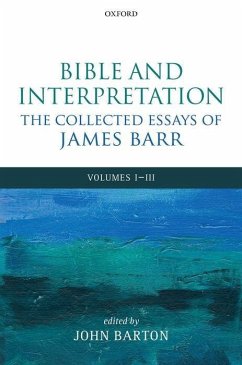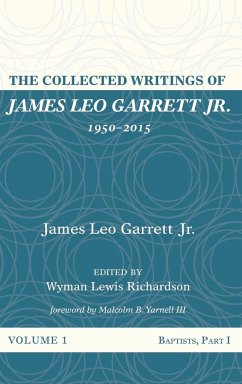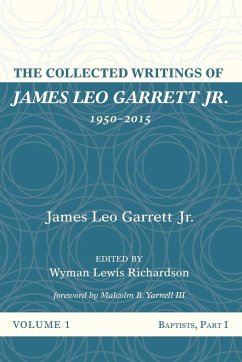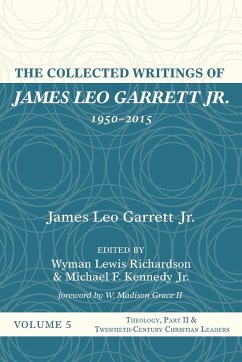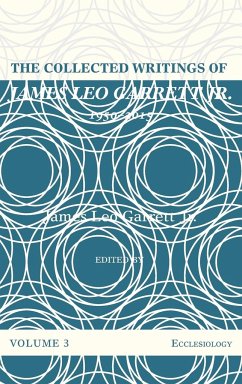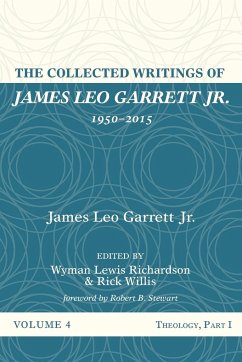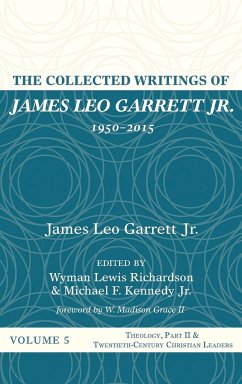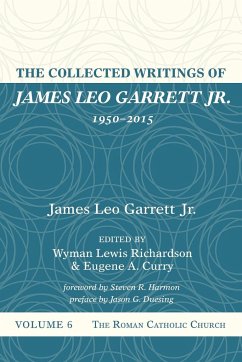James BarrVolumes I-III
Bible and Interpretation: The Collected Essays of James Barr
Volumes I-III
Herausgeber: Barton, John
James BarrVolumes I-III
Bible and Interpretation: The Collected Essays of James Barr
Volumes I-III
Herausgeber: Barton, John
- Broschiertes Buch
- Merkliste
- Auf die Merkliste
- Bewerten Bewerten
- Teilen
- Produkt teilen
- Produkterinnerung
- Produkterinnerung
James Barr was a central figure in twentieth-century biblical scholarship, theology, and the study of biblical languages. These three volumes, which he planned before his death in 2006, gather together many major papers and essays into an accessible collection.
Andere Kunden interessierten sich auch für
![The Collected Writings of James Leo Garrett Jr., 1950-2015 The Collected Writings of James Leo Garrett Jr., 1950-2015]() James Leo Jr. GarrettThe Collected Writings of James Leo Garrett Jr., 1950-201560,99 €
James Leo Jr. GarrettThe Collected Writings of James Leo Garrett Jr., 1950-201560,99 €![The Collected Writings of James Leo Garrett Jr., 1950-2015 The Collected Writings of James Leo Garrett Jr., 1950-2015]() James Leo Jr. GarrettThe Collected Writings of James Leo Garrett Jr., 1950-201541,99 €
James Leo Jr. GarrettThe Collected Writings of James Leo Garrett Jr., 1950-201541,99 €![The Collected Writings of James Leo Garrett Jr., 1950-2015 The Collected Writings of James Leo Garrett Jr., 1950-2015]() James Leo Jr. GarrettThe Collected Writings of James Leo Garrett Jr., 1950-201534,99 €
James Leo Jr. GarrettThe Collected Writings of James Leo Garrett Jr., 1950-201534,99 €![The Collected Writings of James Leo Garrett Jr., 1950-2015 The Collected Writings of James Leo Garrett Jr., 1950-2015]() James Leo Jr. GarrettThe Collected Writings of James Leo Garrett Jr., 1950-201545,99 €
James Leo Jr. GarrettThe Collected Writings of James Leo Garrett Jr., 1950-201545,99 €![The Collected Writings of James Leo Garrett Jr., 1950-2015 The Collected Writings of James Leo Garrett Jr., 1950-2015]() James Leo Jr. GarrettThe Collected Writings of James Leo Garrett Jr., 1950-201534,99 €
James Leo Jr. GarrettThe Collected Writings of James Leo Garrett Jr., 1950-201534,99 €![The Collected Writings of James Leo Garrett Jr., 1950-2015 The Collected Writings of James Leo Garrett Jr., 1950-2015]() James Leo Jr. GarrettThe Collected Writings of James Leo Garrett Jr., 1950-201546,99 €
James Leo Jr. GarrettThe Collected Writings of James Leo Garrett Jr., 1950-201546,99 €![The Collected Writings of James Leo Garrett Jr., 1950-2015 The Collected Writings of James Leo Garrett Jr., 1950-2015]() James Leo Jr. GarrettThe Collected Writings of James Leo Garrett Jr., 1950-201529,99 €
James Leo Jr. GarrettThe Collected Writings of James Leo Garrett Jr., 1950-201529,99 €-
-
-
James Barr was a central figure in twentieth-century biblical scholarship, theology, and the study of biblical languages. These three volumes, which he planned before his death in 2006, gather together many major papers and essays into an accessible collection.
Hinweis: Dieser Artikel kann nur an eine deutsche Lieferadresse ausgeliefert werden.
Hinweis: Dieser Artikel kann nur an eine deutsche Lieferadresse ausgeliefert werden.
Produktdetails
- Produktdetails
- Verlag: Oxford University Press, USA
- Erscheinungstermin: 30. März 2014
- Englisch
- Abmessung: 241mm x 161mm x 129mm
- Gewicht: 3503g
- ISBN-13: 9780198261926
- ISBN-10: 0198261926
- Artikelnr.: 35421927
- Herstellerkennzeichnung
- Libri GmbH
- Europaallee 1
- 36244 Bad Hersfeld
- gpsr@libri.de
- Verlag: Oxford University Press, USA
- Erscheinungstermin: 30. März 2014
- Englisch
- Abmessung: 241mm x 161mm x 129mm
- Gewicht: 3503g
- ISBN-13: 9780198261926
- ISBN-10: 0198261926
- Artikelnr.: 35421927
- Herstellerkennzeichnung
- Libri GmbH
- Europaallee 1
- 36244 Bad Hersfeld
- gpsr@libri.de
VOLUME 1: INTERPRETATION AND HISTORY
John Barton: Foreword
Ernest Nicholson & John Barton: James Barr Remembered
John Barton: Introduction
I: Biblical Interpretation and Biblical Theology
1 Does Biblical Study still belong to Theology?
2 Biblical Scholarship and the Unity of the Church
3 Historical Reading and the Theological Interpretation of Scripture
4 The Bible as a Document of Believing Communities
5 Some Thoughts on Narrative, Myth and Incarnation
6 Reading the Bible as Literature
7 Divine Action and Hebrew Wisdom
8 Biblical Scholarship and the Theory of Truth
9 Literality
10 Exegesis as a Theological Discipline Reconsidered, and the Shadow of the Jesus of History
11 Biblical Criticism as Theological Enlightenment
12 Jowett and the Reading of the Bible 'like any other book'
13 The Bible as a Political Document
14 Revelation through History in the Old Testament and in Modern Theology
15 Semantics and Biblical Theology
16 Story and History in Biblical Theology
17 Biblical Theology
18 Biblical Theology and Revelation in History
19 Trends and Prospects in Biblical Theology
20 The Theological Case against Biblical Theology
21 Some Problems in the Search for a Pan-Biblical Theology
22 Predictions and Surprises: A Response to Walter Brueggemann's Review
II: Authority of Scripture
23 Has the Bible any Authority?
24 Biblical Hermeneutics in Ecumenical Discussion
25 The Authority of Scripture: Dictionary Definition
26 Scriptural Proof
27 The Authority of Scripture: The Book of Genesis and the Origin of Evil in Jewish and Christian Tradition
28 Review of William J. Abraham, Divine Revelation and the Limits of Historical Criticism
III: Judaism
29 Judaism: Its Continuity with the Bible
IV: Natural Theology
30 Biblical Faith and Natural Theology
31 Mowinckel, the Old Testament, and the Question of Natural Theology
32 Biblical Law and the Question of Natural Theology
33 Greek Culture and the Question of Natural Theology
34 Ancient Biblical Laws and Modern Human Rights
V: Environing Religions
35 Philo of Byblos and his 'Phoenician History'
36 The Question of Religious Influence: The Case of Zoroastrianism, Judaism and Christianity
37 The Language of Religion
Index
VOLUME 2: BIBLICAL STUDIES
John Barton: Introduction
I. Old Testament
1 The Old Testament
2 The Old Testament and the new crisis of Biblical Authority
3 The Meaning of 'Mythology' in Relation to the Old Testament
4 Theophany and Anthropomorphism in the Old Testament
5 The Image of God in Genesis: Some Linguistic and Historical Considerations
6 The Image of God in the Book of Genesis: A Study in Terminology
7 The Symbolism of Names in the Old Testament
8 The Book of Job and its Modern Interpreters
9 Jewish Apocalyptic in Recent Scholarly Study
10 An Aspect of Salvation in the Old Testament
11 Review article of M. Brett, Biblical Criticism in Crisis?
12 Hebraic Psychology
13 Review of James L. Kugel, The Idea of Biblical Poetry
14 The Synchronic, the Diachronic, and the Historical: A Triangular Relationshipa
15 Some Semantic Notes on the Covenant
16 Was Everything that God Created really good?: A Question in the First Verse of the Bible
17 Reflections on the Covenant with Noah
18 A Puzzle in Deuteronomy
19 Mythical Monarch Unmasked? Mysterious Doings of Debir King of Eglon
20 Did Isaiah know about Hebrew 'Root Meanings'?
21 Thou art the Cherub': Ezekiel 28.14 and the Post-Ezekiel Understanding of Genesis 2-3
II. New Testament
22 Which Language did Jesus speak? Some Remarks of a Semitist
23 Words for Love in Biblical Greek
24 Abba isn't 'Daddy'
25 The Hebrew/Aramaic Background of 'Hypocrisy' in the Gospels
III. Methods and Implications
26 Allegory and Typology
27 The Literal, the Allegorical, and Modern Biblical Scholarship
28 Allegory and Historicism
29 Childs' Introduction to the Old Testament as Scripture
30 Man and Nature: The Ecological Controversy and the Old Testament
31 Biblical Language and Exegesis: How far does Structuralism help us?
IV. Biblical Chronology
32 Why the World was Created in 4004 BC: Archbishop Usser and Biblical Chronology
33 Biblical Chronology: Legend or Science?
34 Luther and Biblical Chronology
35 Review of W. Adler, Time Immemorial: Archaic History and its Sources in Christian Chronography from Julius Africanus to George Syncellus
36 Pre-scientific Chronology: The Bible and the Origin of the World
V. Fundamentalism
37 Fundamentalism
38 Fundamentalism and Biblical Authority [Religious Fundamentalism]
39 The Fundamentalist Understanding of Scripture
40 The Problem of Fundamentalism Today
41 Fundamentalism' and Evangelical Scholarship
42 The Dynamics of Fundamentalism
43 Foreword to Fundamentalism edited by Martyn Percy
VI. History of Scholarship
44 John Duncan
45 H. H. Rowley
46 Godfrey Rolles Driver
47 George Bradford Caird
48 Remembrances of 'Historical Criticism': Speiser s Genesis Commentary and its History of Reception
49 Wilhelm Vischer and Allegory
50 Friedrich Delitzsch
51 Morris Jastrow
52 Foreword to In Search of Wisdom: Essays in Memory of John G. Gammie
Index
VOLUME 3: LINGUISTICS AND TRANSLATION
John Barton: Introduction
1. Ancient Translations
1 Vocalization and the Analysis of Hebrew among the Ancient Translators
2 Three Interrelated Factors in the Semantic Study of Ancient Hebrew
3 Guessing' in the Septuagint
4 Doubts about Homeophony in the Septuagint
5 Did the Greek Pentateuch really serve as a Dictionary for the Translation of the Later Booksa
6 Seeing the Wood for the Trees? An Enigmatic Ancient Translation
7 erizw and ereidw in the Septuagint: A Note principally on Gen. xlix.6
8 Aramaic-Greek Notes on the Book of Enoch
9 The Meaning of epakouw and Cognates in the LXX
10 Review article of J. Reider, An Index to Aquila
11 Review of P. Walters (Katz), The Text of the Septuagint
12 Review article of Bruce H. Metzger (ed.), The Early Versions of the New Testament
13 Translators' Handling of Verb Tense in Semantically Ambiguous Contexts
14 Cr)b - MOLIS
Prov. xi.31, 1 Peter iv.18
2.NBModern Translations
15 Biblical Translation and the Church
16 After Five Years: A Retrospect on Two Major Translations of the Bible
17 Modern English Bible Versions as a Problem for the Church
3. Hebrew and Semitic Languages
18 Hebrew, Aramaic and Greek in the Hellenistic Age
19 Hebrew Linguistic Literature: From the 16th Century to the Present
20 The Nature of Linguistic Evidence in the Text of the Bible
21 Reading a Script without Vowels
22 Semitic Philology and the Interpretation of the Old Testament
23 The Ancient Semitic Languages: The Conflict between Philology and Linguistics
24 Common Sense and Biblical Language
25 Etymology and the Old Testament
26 Limitations of Etymology as a Lexicographical Instrument in Biblical Hebrew
27 A New Look at Kethibh-Qere
28 Determination and the Definite Article in Biblical Hebrew
29 St Jerome s Appreciation of Hebrew
30 St Jerome and the Sounds of Hebrew
31 Migrash in the Old Testament
32 Ugaritic and Hebrew sbm?
33 One Man or All Humanity? A Question in the Anthropology of Genesis 1
34 Some Notes on ben 'between' in classical Hebrew
35 Hebrew d( especially at Job i.18 and Neh. vii.3
36 Why?' in biblical Hebrew?
37 Is Hebrew 'nest' a Metaphor?
38 Hebrew Orthography and the Book of Job
39 Three Interrelated Factors in the Semantic Study of Ancient Hebrew
40 Scope and Problems in the Semantics of Classical Hebrew
41 Hebrew Lexicography
42 Hebrew Lexicography: Informal Thoughts
43 Philology and Exegesis: Some general Remarks, with Illustrations from Job iii
44 Review of J. Yahuda, Hebrew is Greek
45 Review articles on Koehler-Baumgartner, Hebraisches und Aramaisches Lexikon zum Alten Testament, parts 1 and 2
46 Review article on E Ullendorff, Is Biblical Hebrew a Language?
47 Review of J. Blau, Grammar of Biblical Hebrew
Index
John Barton: Foreword
Ernest Nicholson & John Barton: James Barr Remembered
John Barton: Introduction
I: Biblical Interpretation and Biblical Theology
1 Does Biblical Study still belong to Theology?
2 Biblical Scholarship and the Unity of the Church
3 Historical Reading and the Theological Interpretation of Scripture
4 The Bible as a Document of Believing Communities
5 Some Thoughts on Narrative, Myth and Incarnation
6 Reading the Bible as Literature
7 Divine Action and Hebrew Wisdom
8 Biblical Scholarship and the Theory of Truth
9 Literality
10 Exegesis as a Theological Discipline Reconsidered, and the Shadow of the Jesus of History
11 Biblical Criticism as Theological Enlightenment
12 Jowett and the Reading of the Bible 'like any other book'
13 The Bible as a Political Document
14 Revelation through History in the Old Testament and in Modern Theology
15 Semantics and Biblical Theology
16 Story and History in Biblical Theology
17 Biblical Theology
18 Biblical Theology and Revelation in History
19 Trends and Prospects in Biblical Theology
20 The Theological Case against Biblical Theology
21 Some Problems in the Search for a Pan-Biblical Theology
22 Predictions and Surprises: A Response to Walter Brueggemann's Review
II: Authority of Scripture
23 Has the Bible any Authority?
24 Biblical Hermeneutics in Ecumenical Discussion
25 The Authority of Scripture: Dictionary Definition
26 Scriptural Proof
27 The Authority of Scripture: The Book of Genesis and the Origin of Evil in Jewish and Christian Tradition
28 Review of William J. Abraham, Divine Revelation and the Limits of Historical Criticism
III: Judaism
29 Judaism: Its Continuity with the Bible
IV: Natural Theology
30 Biblical Faith and Natural Theology
31 Mowinckel, the Old Testament, and the Question of Natural Theology
32 Biblical Law and the Question of Natural Theology
33 Greek Culture and the Question of Natural Theology
34 Ancient Biblical Laws and Modern Human Rights
V: Environing Religions
35 Philo of Byblos and his 'Phoenician History'
36 The Question of Religious Influence: The Case of Zoroastrianism, Judaism and Christianity
37 The Language of Religion
Index
VOLUME 2: BIBLICAL STUDIES
John Barton: Introduction
I. Old Testament
1 The Old Testament
2 The Old Testament and the new crisis of Biblical Authority
3 The Meaning of 'Mythology' in Relation to the Old Testament
4 Theophany and Anthropomorphism in the Old Testament
5 The Image of God in Genesis: Some Linguistic and Historical Considerations
6 The Image of God in the Book of Genesis: A Study in Terminology
7 The Symbolism of Names in the Old Testament
8 The Book of Job and its Modern Interpreters
9 Jewish Apocalyptic in Recent Scholarly Study
10 An Aspect of Salvation in the Old Testament
11 Review article of M. Brett, Biblical Criticism in Crisis?
12 Hebraic Psychology
13 Review of James L. Kugel, The Idea of Biblical Poetry
14 The Synchronic, the Diachronic, and the Historical: A Triangular Relationshipa
15 Some Semantic Notes on the Covenant
16 Was Everything that God Created really good?: A Question in the First Verse of the Bible
17 Reflections on the Covenant with Noah
18 A Puzzle in Deuteronomy
19 Mythical Monarch Unmasked? Mysterious Doings of Debir King of Eglon
20 Did Isaiah know about Hebrew 'Root Meanings'?
21 Thou art the Cherub': Ezekiel 28.14 and the Post-Ezekiel Understanding of Genesis 2-3
II. New Testament
22 Which Language did Jesus speak? Some Remarks of a Semitist
23 Words for Love in Biblical Greek
24 Abba isn't 'Daddy'
25 The Hebrew/Aramaic Background of 'Hypocrisy' in the Gospels
III. Methods and Implications
26 Allegory and Typology
27 The Literal, the Allegorical, and Modern Biblical Scholarship
28 Allegory and Historicism
29 Childs' Introduction to the Old Testament as Scripture
30 Man and Nature: The Ecological Controversy and the Old Testament
31 Biblical Language and Exegesis: How far does Structuralism help us?
IV. Biblical Chronology
32 Why the World was Created in 4004 BC: Archbishop Usser and Biblical Chronology
33 Biblical Chronology: Legend or Science?
34 Luther and Biblical Chronology
35 Review of W. Adler, Time Immemorial: Archaic History and its Sources in Christian Chronography from Julius Africanus to George Syncellus
36 Pre-scientific Chronology: The Bible and the Origin of the World
V. Fundamentalism
37 Fundamentalism
38 Fundamentalism and Biblical Authority [Religious Fundamentalism]
39 The Fundamentalist Understanding of Scripture
40 The Problem of Fundamentalism Today
41 Fundamentalism' and Evangelical Scholarship
42 The Dynamics of Fundamentalism
43 Foreword to Fundamentalism edited by Martyn Percy
VI. History of Scholarship
44 John Duncan
45 H. H. Rowley
46 Godfrey Rolles Driver
47 George Bradford Caird
48 Remembrances of 'Historical Criticism': Speiser s Genesis Commentary and its History of Reception
49 Wilhelm Vischer and Allegory
50 Friedrich Delitzsch
51 Morris Jastrow
52 Foreword to In Search of Wisdom: Essays in Memory of John G. Gammie
Index
VOLUME 3: LINGUISTICS AND TRANSLATION
John Barton: Introduction
1. Ancient Translations
1 Vocalization and the Analysis of Hebrew among the Ancient Translators
2 Three Interrelated Factors in the Semantic Study of Ancient Hebrew
3 Guessing' in the Septuagint
4 Doubts about Homeophony in the Septuagint
5 Did the Greek Pentateuch really serve as a Dictionary for the Translation of the Later Booksa
6 Seeing the Wood for the Trees? An Enigmatic Ancient Translation
7 erizw and ereidw in the Septuagint: A Note principally on Gen. xlix.6
8 Aramaic-Greek Notes on the Book of Enoch
9 The Meaning of epakouw and Cognates in the LXX
10 Review article of J. Reider, An Index to Aquila
11 Review of P. Walters (Katz), The Text of the Septuagint
12 Review article of Bruce H. Metzger (ed.), The Early Versions of the New Testament
13 Translators' Handling of Verb Tense in Semantically Ambiguous Contexts
14 Cr)b - MOLIS
Prov. xi.31, 1 Peter iv.18
2.NBModern Translations
15 Biblical Translation and the Church
16 After Five Years: A Retrospect on Two Major Translations of the Bible
17 Modern English Bible Versions as a Problem for the Church
3. Hebrew and Semitic Languages
18 Hebrew, Aramaic and Greek in the Hellenistic Age
19 Hebrew Linguistic Literature: From the 16th Century to the Present
20 The Nature of Linguistic Evidence in the Text of the Bible
21 Reading a Script without Vowels
22 Semitic Philology and the Interpretation of the Old Testament
23 The Ancient Semitic Languages: The Conflict between Philology and Linguistics
24 Common Sense and Biblical Language
25 Etymology and the Old Testament
26 Limitations of Etymology as a Lexicographical Instrument in Biblical Hebrew
27 A New Look at Kethibh-Qere
28 Determination and the Definite Article in Biblical Hebrew
29 St Jerome s Appreciation of Hebrew
30 St Jerome and the Sounds of Hebrew
31 Migrash in the Old Testament
32 Ugaritic and Hebrew sbm?
33 One Man or All Humanity? A Question in the Anthropology of Genesis 1
34 Some Notes on ben 'between' in classical Hebrew
35 Hebrew d( especially at Job i.18 and Neh. vii.3
36 Why?' in biblical Hebrew?
37 Is Hebrew 'nest' a Metaphor?
38 Hebrew Orthography and the Book of Job
39 Three Interrelated Factors in the Semantic Study of Ancient Hebrew
40 Scope and Problems in the Semantics of Classical Hebrew
41 Hebrew Lexicography
42 Hebrew Lexicography: Informal Thoughts
43 Philology and Exegesis: Some general Remarks, with Illustrations from Job iii
44 Review of J. Yahuda, Hebrew is Greek
45 Review articles on Koehler-Baumgartner, Hebraisches und Aramaisches Lexikon zum Alten Testament, parts 1 and 2
46 Review article on E Ullendorff, Is Biblical Hebrew a Language?
47 Review of J. Blau, Grammar of Biblical Hebrew
Index
VOLUME 1: INTERPRETATION AND HISTORY
John Barton: Foreword
Ernest Nicholson & John Barton: James Barr Remembered
John Barton: Introduction
I: Biblical Interpretation and Biblical Theology
1 Does Biblical Study still belong to Theology?
2 Biblical Scholarship and the Unity of the Church
3 Historical Reading and the Theological Interpretation of Scripture
4 The Bible as a Document of Believing Communities
5 Some Thoughts on Narrative, Myth and Incarnation
6 Reading the Bible as Literature
7 Divine Action and Hebrew Wisdom
8 Biblical Scholarship and the Theory of Truth
9 Literality
10 Exegesis as a Theological Discipline Reconsidered, and the Shadow of the Jesus of History
11 Biblical Criticism as Theological Enlightenment
12 Jowett and the Reading of the Bible 'like any other book'
13 The Bible as a Political Document
14 Revelation through History in the Old Testament and in Modern Theology
15 Semantics and Biblical Theology
16 Story and History in Biblical Theology
17 Biblical Theology
18 Biblical Theology and Revelation in History
19 Trends and Prospects in Biblical Theology
20 The Theological Case against Biblical Theology
21 Some Problems in the Search for a Pan-Biblical Theology
22 Predictions and Surprises: A Response to Walter Brueggemann's Review
II: Authority of Scripture
23 Has the Bible any Authority?
24 Biblical Hermeneutics in Ecumenical Discussion
25 The Authority of Scripture: Dictionary Definition
26 Scriptural Proof
27 The Authority of Scripture: The Book of Genesis and the Origin of Evil in Jewish and Christian Tradition
28 Review of William J. Abraham, Divine Revelation and the Limits of Historical Criticism
III: Judaism
29 Judaism: Its Continuity with the Bible
IV: Natural Theology
30 Biblical Faith and Natural Theology
31 Mowinckel, the Old Testament, and the Question of Natural Theology
32 Biblical Law and the Question of Natural Theology
33 Greek Culture and the Question of Natural Theology
34 Ancient Biblical Laws and Modern Human Rights
V: Environing Religions
35 Philo of Byblos and his 'Phoenician History'
36 The Question of Religious Influence: The Case of Zoroastrianism, Judaism and Christianity
37 The Language of Religion
Index
VOLUME 2: BIBLICAL STUDIES
John Barton: Introduction
I. Old Testament
1 The Old Testament
2 The Old Testament and the new crisis of Biblical Authority
3 The Meaning of 'Mythology' in Relation to the Old Testament
4 Theophany and Anthropomorphism in the Old Testament
5 The Image of God in Genesis: Some Linguistic and Historical Considerations
6 The Image of God in the Book of Genesis: A Study in Terminology
7 The Symbolism of Names in the Old Testament
8 The Book of Job and its Modern Interpreters
9 Jewish Apocalyptic in Recent Scholarly Study
10 An Aspect of Salvation in the Old Testament
11 Review article of M. Brett, Biblical Criticism in Crisis?
12 Hebraic Psychology
13 Review of James L. Kugel, The Idea of Biblical Poetry
14 The Synchronic, the Diachronic, and the Historical: A Triangular Relationshipa
15 Some Semantic Notes on the Covenant
16 Was Everything that God Created really good?: A Question in the First Verse of the Bible
17 Reflections on the Covenant with Noah
18 A Puzzle in Deuteronomy
19 Mythical Monarch Unmasked? Mysterious Doings of Debir King of Eglon
20 Did Isaiah know about Hebrew 'Root Meanings'?
21 Thou art the Cherub': Ezekiel 28.14 and the Post-Ezekiel Understanding of Genesis 2-3
II. New Testament
22 Which Language did Jesus speak? Some Remarks of a Semitist
23 Words for Love in Biblical Greek
24 Abba isn't 'Daddy'
25 The Hebrew/Aramaic Background of 'Hypocrisy' in the Gospels
III. Methods and Implications
26 Allegory and Typology
27 The Literal, the Allegorical, and Modern Biblical Scholarship
28 Allegory and Historicism
29 Childs' Introduction to the Old Testament as Scripture
30 Man and Nature: The Ecological Controversy and the Old Testament
31 Biblical Language and Exegesis: How far does Structuralism help us?
IV. Biblical Chronology
32 Why the World was Created in 4004 BC: Archbishop Usser and Biblical Chronology
33 Biblical Chronology: Legend or Science?
34 Luther and Biblical Chronology
35 Review of W. Adler, Time Immemorial: Archaic History and its Sources in Christian Chronography from Julius Africanus to George Syncellus
36 Pre-scientific Chronology: The Bible and the Origin of the World
V. Fundamentalism
37 Fundamentalism
38 Fundamentalism and Biblical Authority [Religious Fundamentalism]
39 The Fundamentalist Understanding of Scripture
40 The Problem of Fundamentalism Today
41 Fundamentalism' and Evangelical Scholarship
42 The Dynamics of Fundamentalism
43 Foreword to Fundamentalism edited by Martyn Percy
VI. History of Scholarship
44 John Duncan
45 H. H. Rowley
46 Godfrey Rolles Driver
47 George Bradford Caird
48 Remembrances of 'Historical Criticism': Speiser s Genesis Commentary and its History of Reception
49 Wilhelm Vischer and Allegory
50 Friedrich Delitzsch
51 Morris Jastrow
52 Foreword to In Search of Wisdom: Essays in Memory of John G. Gammie
Index
VOLUME 3: LINGUISTICS AND TRANSLATION
John Barton: Introduction
1. Ancient Translations
1 Vocalization and the Analysis of Hebrew among the Ancient Translators
2 Three Interrelated Factors in the Semantic Study of Ancient Hebrew
3 Guessing' in the Septuagint
4 Doubts about Homeophony in the Septuagint
5 Did the Greek Pentateuch really serve as a Dictionary for the Translation of the Later Booksa
6 Seeing the Wood for the Trees? An Enigmatic Ancient Translation
7 erizw and ereidw in the Septuagint: A Note principally on Gen. xlix.6
8 Aramaic-Greek Notes on the Book of Enoch
9 The Meaning of epakouw and Cognates in the LXX
10 Review article of J. Reider, An Index to Aquila
11 Review of P. Walters (Katz), The Text of the Septuagint
12 Review article of Bruce H. Metzger (ed.), The Early Versions of the New Testament
13 Translators' Handling of Verb Tense in Semantically Ambiguous Contexts
14 Cr)b - MOLIS
Prov. xi.31, 1 Peter iv.18
2.NBModern Translations
15 Biblical Translation and the Church
16 After Five Years: A Retrospect on Two Major Translations of the Bible
17 Modern English Bible Versions as a Problem for the Church
3. Hebrew and Semitic Languages
18 Hebrew, Aramaic and Greek in the Hellenistic Age
19 Hebrew Linguistic Literature: From the 16th Century to the Present
20 The Nature of Linguistic Evidence in the Text of the Bible
21 Reading a Script without Vowels
22 Semitic Philology and the Interpretation of the Old Testament
23 The Ancient Semitic Languages: The Conflict between Philology and Linguistics
24 Common Sense and Biblical Language
25 Etymology and the Old Testament
26 Limitations of Etymology as a Lexicographical Instrument in Biblical Hebrew
27 A New Look at Kethibh-Qere
28 Determination and the Definite Article in Biblical Hebrew
29 St Jerome s Appreciation of Hebrew
30 St Jerome and the Sounds of Hebrew
31 Migrash in the Old Testament
32 Ugaritic and Hebrew sbm?
33 One Man or All Humanity? A Question in the Anthropology of Genesis 1
34 Some Notes on ben 'between' in classical Hebrew
35 Hebrew d( especially at Job i.18 and Neh. vii.3
36 Why?' in biblical Hebrew?
37 Is Hebrew 'nest' a Metaphor?
38 Hebrew Orthography and the Book of Job
39 Three Interrelated Factors in the Semantic Study of Ancient Hebrew
40 Scope and Problems in the Semantics of Classical Hebrew
41 Hebrew Lexicography
42 Hebrew Lexicography: Informal Thoughts
43 Philology and Exegesis: Some general Remarks, with Illustrations from Job iii
44 Review of J. Yahuda, Hebrew is Greek
45 Review articles on Koehler-Baumgartner, Hebraisches und Aramaisches Lexikon zum Alten Testament, parts 1 and 2
46 Review article on E Ullendorff, Is Biblical Hebrew a Language?
47 Review of J. Blau, Grammar of Biblical Hebrew
Index
John Barton: Foreword
Ernest Nicholson & John Barton: James Barr Remembered
John Barton: Introduction
I: Biblical Interpretation and Biblical Theology
1 Does Biblical Study still belong to Theology?
2 Biblical Scholarship and the Unity of the Church
3 Historical Reading and the Theological Interpretation of Scripture
4 The Bible as a Document of Believing Communities
5 Some Thoughts on Narrative, Myth and Incarnation
6 Reading the Bible as Literature
7 Divine Action and Hebrew Wisdom
8 Biblical Scholarship and the Theory of Truth
9 Literality
10 Exegesis as a Theological Discipline Reconsidered, and the Shadow of the Jesus of History
11 Biblical Criticism as Theological Enlightenment
12 Jowett and the Reading of the Bible 'like any other book'
13 The Bible as a Political Document
14 Revelation through History in the Old Testament and in Modern Theology
15 Semantics and Biblical Theology
16 Story and History in Biblical Theology
17 Biblical Theology
18 Biblical Theology and Revelation in History
19 Trends and Prospects in Biblical Theology
20 The Theological Case against Biblical Theology
21 Some Problems in the Search for a Pan-Biblical Theology
22 Predictions and Surprises: A Response to Walter Brueggemann's Review
II: Authority of Scripture
23 Has the Bible any Authority?
24 Biblical Hermeneutics in Ecumenical Discussion
25 The Authority of Scripture: Dictionary Definition
26 Scriptural Proof
27 The Authority of Scripture: The Book of Genesis and the Origin of Evil in Jewish and Christian Tradition
28 Review of William J. Abraham, Divine Revelation and the Limits of Historical Criticism
III: Judaism
29 Judaism: Its Continuity with the Bible
IV: Natural Theology
30 Biblical Faith and Natural Theology
31 Mowinckel, the Old Testament, and the Question of Natural Theology
32 Biblical Law and the Question of Natural Theology
33 Greek Culture and the Question of Natural Theology
34 Ancient Biblical Laws and Modern Human Rights
V: Environing Religions
35 Philo of Byblos and his 'Phoenician History'
36 The Question of Religious Influence: The Case of Zoroastrianism, Judaism and Christianity
37 The Language of Religion
Index
VOLUME 2: BIBLICAL STUDIES
John Barton: Introduction
I. Old Testament
1 The Old Testament
2 The Old Testament and the new crisis of Biblical Authority
3 The Meaning of 'Mythology' in Relation to the Old Testament
4 Theophany and Anthropomorphism in the Old Testament
5 The Image of God in Genesis: Some Linguistic and Historical Considerations
6 The Image of God in the Book of Genesis: A Study in Terminology
7 The Symbolism of Names in the Old Testament
8 The Book of Job and its Modern Interpreters
9 Jewish Apocalyptic in Recent Scholarly Study
10 An Aspect of Salvation in the Old Testament
11 Review article of M. Brett, Biblical Criticism in Crisis?
12 Hebraic Psychology
13 Review of James L. Kugel, The Idea of Biblical Poetry
14 The Synchronic, the Diachronic, and the Historical: A Triangular Relationshipa
15 Some Semantic Notes on the Covenant
16 Was Everything that God Created really good?: A Question in the First Verse of the Bible
17 Reflections on the Covenant with Noah
18 A Puzzle in Deuteronomy
19 Mythical Monarch Unmasked? Mysterious Doings of Debir King of Eglon
20 Did Isaiah know about Hebrew 'Root Meanings'?
21 Thou art the Cherub': Ezekiel 28.14 and the Post-Ezekiel Understanding of Genesis 2-3
II. New Testament
22 Which Language did Jesus speak? Some Remarks of a Semitist
23 Words for Love in Biblical Greek
24 Abba isn't 'Daddy'
25 The Hebrew/Aramaic Background of 'Hypocrisy' in the Gospels
III. Methods and Implications
26 Allegory and Typology
27 The Literal, the Allegorical, and Modern Biblical Scholarship
28 Allegory and Historicism
29 Childs' Introduction to the Old Testament as Scripture
30 Man and Nature: The Ecological Controversy and the Old Testament
31 Biblical Language and Exegesis: How far does Structuralism help us?
IV. Biblical Chronology
32 Why the World was Created in 4004 BC: Archbishop Usser and Biblical Chronology
33 Biblical Chronology: Legend or Science?
34 Luther and Biblical Chronology
35 Review of W. Adler, Time Immemorial: Archaic History and its Sources in Christian Chronography from Julius Africanus to George Syncellus
36 Pre-scientific Chronology: The Bible and the Origin of the World
V. Fundamentalism
37 Fundamentalism
38 Fundamentalism and Biblical Authority [Religious Fundamentalism]
39 The Fundamentalist Understanding of Scripture
40 The Problem of Fundamentalism Today
41 Fundamentalism' and Evangelical Scholarship
42 The Dynamics of Fundamentalism
43 Foreword to Fundamentalism edited by Martyn Percy
VI. History of Scholarship
44 John Duncan
45 H. H. Rowley
46 Godfrey Rolles Driver
47 George Bradford Caird
48 Remembrances of 'Historical Criticism': Speiser s Genesis Commentary and its History of Reception
49 Wilhelm Vischer and Allegory
50 Friedrich Delitzsch
51 Morris Jastrow
52 Foreword to In Search of Wisdom: Essays in Memory of John G. Gammie
Index
VOLUME 3: LINGUISTICS AND TRANSLATION
John Barton: Introduction
1. Ancient Translations
1 Vocalization and the Analysis of Hebrew among the Ancient Translators
2 Three Interrelated Factors in the Semantic Study of Ancient Hebrew
3 Guessing' in the Septuagint
4 Doubts about Homeophony in the Septuagint
5 Did the Greek Pentateuch really serve as a Dictionary for the Translation of the Later Booksa
6 Seeing the Wood for the Trees? An Enigmatic Ancient Translation
7 erizw and ereidw in the Septuagint: A Note principally on Gen. xlix.6
8 Aramaic-Greek Notes on the Book of Enoch
9 The Meaning of epakouw and Cognates in the LXX
10 Review article of J. Reider, An Index to Aquila
11 Review of P. Walters (Katz), The Text of the Septuagint
12 Review article of Bruce H. Metzger (ed.), The Early Versions of the New Testament
13 Translators' Handling of Verb Tense in Semantically Ambiguous Contexts
14 Cr)b - MOLIS
Prov. xi.31, 1 Peter iv.18
2.NBModern Translations
15 Biblical Translation and the Church
16 After Five Years: A Retrospect on Two Major Translations of the Bible
17 Modern English Bible Versions as a Problem for the Church
3. Hebrew and Semitic Languages
18 Hebrew, Aramaic and Greek in the Hellenistic Age
19 Hebrew Linguistic Literature: From the 16th Century to the Present
20 The Nature of Linguistic Evidence in the Text of the Bible
21 Reading a Script without Vowels
22 Semitic Philology and the Interpretation of the Old Testament
23 The Ancient Semitic Languages: The Conflict between Philology and Linguistics
24 Common Sense and Biblical Language
25 Etymology and the Old Testament
26 Limitations of Etymology as a Lexicographical Instrument in Biblical Hebrew
27 A New Look at Kethibh-Qere
28 Determination and the Definite Article in Biblical Hebrew
29 St Jerome s Appreciation of Hebrew
30 St Jerome and the Sounds of Hebrew
31 Migrash in the Old Testament
32 Ugaritic and Hebrew sbm?
33 One Man or All Humanity? A Question in the Anthropology of Genesis 1
34 Some Notes on ben 'between' in classical Hebrew
35 Hebrew d( especially at Job i.18 and Neh. vii.3
36 Why?' in biblical Hebrew?
37 Is Hebrew 'nest' a Metaphor?
38 Hebrew Orthography and the Book of Job
39 Three Interrelated Factors in the Semantic Study of Ancient Hebrew
40 Scope and Problems in the Semantics of Classical Hebrew
41 Hebrew Lexicography
42 Hebrew Lexicography: Informal Thoughts
43 Philology and Exegesis: Some general Remarks, with Illustrations from Job iii
44 Review of J. Yahuda, Hebrew is Greek
45 Review articles on Koehler-Baumgartner, Hebraisches und Aramaisches Lexikon zum Alten Testament, parts 1 and 2
46 Review article on E Ullendorff, Is Biblical Hebrew a Language?
47 Review of J. Blau, Grammar of Biblical Hebrew
Index

